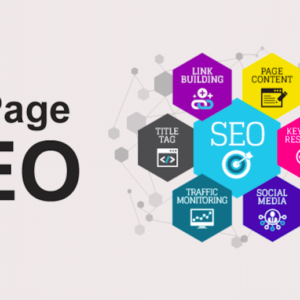Preface
Search Engine Optimization (SEO) is the driving force behind successful digital marketing efforts. It’s the secret sauce that ensures your online presence doesn’t go unnoticed. In the vast landscape of the internet, SEO acts as a beacon, guiding search engines to recognize and rank your content. But what exactly is SEO, and why is it crucial in the world of digital marketing?
Key Components of SEO

On-Page SEO
On-page SEO involves optimizing individual web pages to rank higher and earn more relevant traffic. This includes elements such as content, meta tags, and keyword placement. Crafting compelling, keyword-rich content is the cornerstone of on-page SEO.
Off-Page SEO
Contrary to on-page SEO, off-page SEO focuses on activities outside your website that impact your rankings. Building high-quality backlinks and cultivating a positive online reputation are key aspects of off-page SEO.
Technical SEO
Technical SEO deals with the backend of your website. It ensures that search engines can crawl and index your site without any issues. From website speed to mobile-friendliness, technical SEO lays the foundation for a search engine-friendly website.
Understanding Search Engines
search engines act as gatekeepers, directing users to the most relevant and valuable content. Understanding how search engines work and the intricate algorithms they use is paramount for effective SEO strategies.
How Search Engines Work
Search engines use complex algorithms to analyze and rank web pages. They consider factors like relevance, authority, and user experience to deliver the best results for a user’s query.
Importance of Search Engine Algorithms
Search engine algorithms continually evolve to provide users with the most accurate and up-to-date information. Search Engine Optimization professionals must stay informed about these changes to adapt their strategies accordingly.
Keyword Research and Analysis
Keywords are the building blocks of SEO. They are the terms and phrases users enter into search engines. Effective keyword research and analysis are crucial for understanding what your audience is searching for and tailoring your content accordingly.
Significance of Keywords
Keywords bridge the gap between what your audience is searching for and the content you provide. Incorporating relevant keywords strategically improves your chances of ranking higher in search results.
Tools for Effective Keyword Research
Various tools, such as Google Keyword Planner and SEMrush, aid in identifying relevant keywords and understanding their search volume. These tools empower SEO professionals to make informed decisions about content creation.
Content Optimization for SEO
Creating high-quality, engaging content is at the heart of successful SEO. It’s not just about keywords; it’s about providing value to your audience.
Crafting High-Quality Content
Search engines prioritize content that addresses user intent. Crafting content that is informative, engaging, and relevant to your target audience is key to SEO success.
Importance of Meta Tags and Descriptions
Meta tags and descriptions provide search engines with information about your content. Well-crafted meta tags and descriptions improve click-through rates and contribute to higher rankings.
Link Building Strategies

The Role of Backlinks in SEO
- Backlinks, or inbound links from other websites, signal to search engines that your content is reputable and valuable. Quality over quantity is the mantra for successful link building.
White Hat vs. Black Hat Techniques
- White hat techniques focus on ethical practices to improve rankings, while black hat techniques use shortcuts that may lead to penalties. Building a robust backlink profile through ethical means is a sustainable SEO strategy.
Mobile Optimization
- In an era where mobile devices dominate internet usage, having a mobile-friendly website is no longer an option—it's a necessity.
Importance of Mobile-Friendly Websites
- Google's mobile-first indexing prioritizes mobile-friendly websites. A responsive design ensures a seamless user experience across devices, positively impacting your SEO rankings.
Google's Mobile-First Indexing
- Google now primarily uses the mobile version of a site for indexing and ranking. Adapting to mobile-first indexing is vital for maintaining and improving SEO performance.
Local SEO
- Local SEO is a game-changer for businesses with physical locations, helping them connect with local audiences.
Targeting Local Audiences
- Optimizing for local searches includes creating location-specific content and managing online reviews. This ensures your business appears in local search results.
Importance for Businesses with Physical Locations
- For brick-and-mortar businesses, local SEO is a lifeline. It puts your business on the map—literally—and attracts nearby customers searching for products or services you offer.
SEO Analytics and Reporting
Monitoring Website Performance
Search Engine Optimization is an ongoing process, and regularly monitoring website performance is crucial for success. Analytics tools provide insights into user behavior, traffic sources, and more.
Utilizing Analytics Tools
Tools like Google Analytics and SEO platforms offer valuable data for refining SEO strategies. Analyzing user behavior helps in making informed decisions to improve website performance.
Algorithm Updates and Adaptation

Staying Abreast of Search Engine Algorithm Changes
- Search engines frequently update their algorithms. Staying informed about these changes is vital for adapting your SEO strategies to remain effective.
Adapting Strategies Accordingly
- When algorithms change, SEO professionals must adapt quickly. Understanding the impact of updates and adjusting strategies ensures continued visibility in search results.
SEO and Social Media Integration
- The intersection of SEO and social media is a dynamic space that can significantly impact your digital presence.
The Impact of Social Media on SEO
- Social media signals are considered by search engines in ranking algorithms. A strong social media presence can amplify the reach and impact of your SEO efforts.
Strategies for Effective Integration
- Integrating SEO and social media involves cross-promotion, sharing content, and engaging with your audience across platforms. This synergy enhances your online visibility and authority.
Voice Search Optimization
- The rise of voice-activated search is reshaping the SEO landscape, demanding a shift in optimization strategies.
Adjusting SEO Strategies for Voice Search
- Long-tail keywords and conversational content are crucial for voice search optimization. Adapting your content to match the way people speak enhances your chances of appearing in voice search results.
Common SEO Mistakes to Avoid
In the complex world of Search Engine Optimization, pitfalls are abundant. Steering clear of common mistakes is essential for sustained success.
Over-Optimization Pitfalls
Overloading content with keywords, known as keyword stuffing, can harm your rankings. Striking the right balance between optimization and natural language is key.
Ignoring Technical Aspects
Neglecting technical SEO issues, such as slow page speed or poor website structure, can hinder your rankings. Addressing these aspects ensures a smooth user experience and better search engine visibility.
Future Trends in SEO
Search Engine Optimization is an ever-evolving field, and staying ahead of the curve is essential for continued success.

Predictions for the Future of SEO
Artificial intelligence, user experience, and new search technologies are shaping the future of SEO. Adapting to these trends positions your digital strategy for long-term success.
Preparing for Upcoming Changes
Being proactive and embracing emerging trends keeps your SEO strategies effective. Continuous learning and adaptation are the keys to staying competitive in the dynamic world of digital marketing.
Final Thoughts:
SEO is the cornerstone of online success. From the basics of keyword optimization to the intricacies of algorithm updates, mastering Search Engine Optimization is an ongoing journey. By staying informed, adapting strategies, and embracing emerging trends, businesses can ensure a strong and sustainable online presence.
FAQs:
SEO enhances the visibility and ranking of a website in search engine results, driving organic traffic and improving online presence.
Search engine algorithms undergo frequent updates, with major changes occurring several times a year.
Mobile optimization is vital as Google’s mobile-first indexing prioritizes mobile-friendly websites, impacting search rankings.
On-page SEO involves optimizing individual web pages through content, meta tags, and keyword placement.
Voice search requires optimization for natural language queries and the incorporation of conversational content to align with user behavior.








